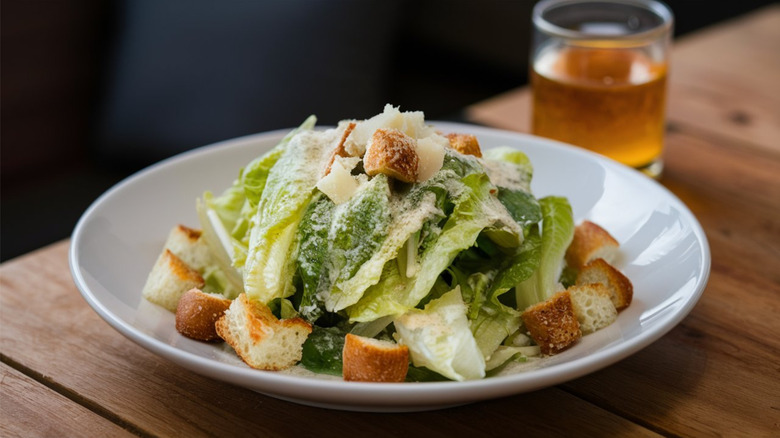Anthony Bourdain's Warning Against Chicken Caesar On Restaurant Menus
We may receive a commission on purchases made from links.
Anthony Bourdain had major beef with chicken Caesar salad – one of the foods Bourdain hated yet one of the most popular salads in the United States –- even writing in his book "Appetites," "God does not want you to put chicken on your Caesar." His main gripe: authenticity or the lack of it. According to Bourdain, chicken Caesar salad is not only inauthentic but a sign that someone in the restaurant has made significant compromises to the menu.
Bourdain explained to "First We Feast" in 2016 that most restaurants put chicken Caesar on their menu not because they love the dish but "because they know it'll sell." You can tell right away from a menu if a restaurant is "legit," he explained, by whether or not the menu has a personal touch. Bourdain offered New York City's Prune, which closed in 2020 and was once under the helm of chef Gabrielle Hamilton, as an example of a restaurant with a "personal" menu which, notably, did not offer chicken Caesar salad on its menu.
"Most of the recipes [on the menu] evoke specific likes and dislikes, and even personal history of the chef and restaurateur," Bourdain said. A menu offering chicken Caesar is a tell-tale sign that a restaurant is "trying to be everything to everybody." Generally, Bourdain's favorite restaurants had minimal menus with "two or three" items, as he told Money in 2018, and "it looks like they've been doing those same three things for a very long time."
Anthony Bourdain loved Caesar salad sans chicken
Anthony Bourdain, whose culinary career had humble beginnings, hated chicken Caesar because it strayed from the traditional version of the salad invented in Mexico, even referring to Caesar salad — without chicken — in "Appetites" as "another reason to love Mexico."
The salad likely originated in Tijuana in the early 1920s as Prohibition in the U.S. was in full swing. So the story goes, Caesar salad was invented by Italian immigrant and chef Caesar Cardini on July 4, 1924, to feed the crowds of American customers flocking across the border. The rush of Americans looking for good food and legal booze on Fourth of July weekend left Cardini short on ingredients; he threw together a dish from what was left in his kitchen: romaine lettuce, Parmesan cheese, lemon juice, dijon mustard, Worcestershire sauce, garlic, olive oil, salt, pepper, raw egg, and day-old bread for croutons. Aptly named Caesar's Restaurant, the establishment is still open 100 years later.
Bourdain's own recipe for Caesar salad in "Appetites" echoes Cardini's original concoction with minimal deviations, save for the addition of oil-packed anchovies to the dressing for brine and depth of flavor. The celebrity chef's recipe also includes a dash of Tabasco to the dressing, which is tossed gently on the leaves and served with boquerones (cured anchovies) as a garnish. Overall, a basic Caesar salad should be light, refreshing, and uninhibited, as Bourdain wrote in "Appetites," by "sad, overcooked, characterless strips of grilled chicken cutlet."


